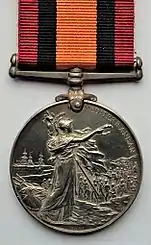Queen's Mediterranean Medal
The Queen's Mediterranean Medal was authorised by King Edward VII and was awarded to Militia troops[1] who had replaced their regular Army counterparts in the various military garrisons across the Mediterranean, in Gibraltar, Malta[2] and Egypt.[3] This allowed regular troops to be available for the Second Boer War.[2]
| Queen's Mediterranean Medal | |
|---|---|
  Obverse and reverse of the medal. | |
| Type | Campaign medal |
| Awarded for | Campaign service |
| Description | Silver disk 36 mm wide |
| Presented by | United Kingdom of Great Britain and Ireland |
| Eligibility | British Army |
| Campaign(s) | Boer War 1899-1902 |
| Clasps | None |
| Established | 1902 |
| Total | 5,000 |
Troops on the island of St. Helena who were guarding Boer prisoners of war in the POW camp were awarded the Queen's South Africa Medal without clasp.[1]
The medal and ribbon are identical to the Queen's South Africa Medal 1899-1902 except the inscription 'SOUTH AFRICA' has been replaced by the word 'MEDITERRANEAN' on the reverse of the medal. No clasps were awarded.[4] The recipient's name and details were impressed on the rim of the medal.[5]
Recipients
Approximately 5,000 of the Queen's Mediterranean Medal were awarded. They were issued to eligible officers and men in the Third (Militia) Battalions of the: Royal Northumberland Fusiliers, Royal Fusiliers, West Yorkshire Regiment, Royal North Lancashire Regiment, Royal West Kent Regiment, King's Own Yorkshire Light Infantry, Seaforth Highlanders and the Royal Munster Fusiliers.[6]
References
- Dorling, H. Taprell (1956). Ribbons and Medals. London: A.H.Baldwin & Sons. p. 72. OCLC 930416375.
- Medal Yearbook 2015 by J.W.Mussell, editor, page 166 (Token Publishing Limited, Honiton, Devon)
- Seaforth Highlanders by John Sym, page 126 (1962, Gale & Polden, Aldershot) Confirms Seaforth Militia battalion served in Cairo.
- Queen's Mediterranean Medal on Anglo Boer War.com
- British Battles and Medals, 6th edition. Edited by Joslin, Litherland and Simpkin, page 204 (1988, Spink, London)
- British Battles and Medals by Major Lawrence L. Gordon, page 208 (1947, Gale & Polden, Aldershot)